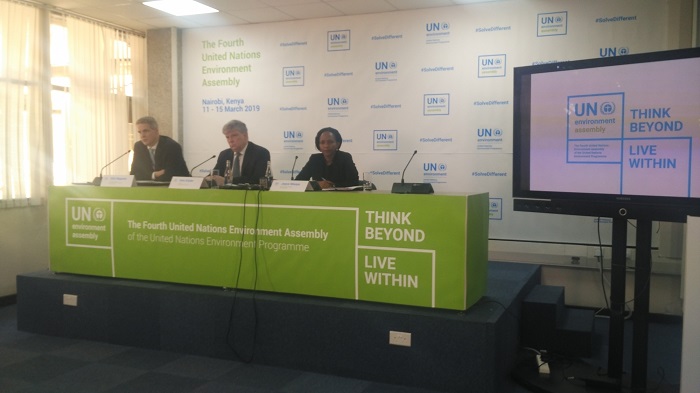
Nairobi, A total of 4,700 heads of state, business leaders, senior UN officials and civil society representatives, who are gathering in this Kenyan city for a five-day meeting of the world’s top body on the environment, will take bold decisions that move global societies to a more sustainable path.
The fourth UN Environment Assembly began on Monday under the theme “Innovative Solutions for Environmental Challenges and Sustainable Consumption and Production”.
It is the biggest gathering in the Assembly’s short history, with attendance almost double the last event in December 2017.
Prominent world leaders attending the Assembly will include French President Emmanuel Macron and Kenyan President Uhuru Kenyatta along with CEOs from major corporations.
“Everyone can contribute to solutions to pollution. Policy direction from the government, like the single-use plastic ban helps set the tone for businesses and encourages them to develop sustainable solutions,” UN Environment’s Acting Executive Director Joyce Msuya told IANS.
On her expectations from individuals, governments, civil societies and businesses globally, she said: “Upwards pressure from individuals changing their habits and civil society campaigns force business to provide the non-polluting products that consumers demand.”
Bold decisions and outcomes are expected as the delegates will negotiate late into the night for five days, says the UN Environment.
Resolutions are on the table to push harder for sustainable consumption and production patterns, commit to the protection of the marine environment from plastic pollution, reduce food waste, and advance technological innovation that combats climate change, and reduces resource use and bio-diversity loss.
This Assembly’s status as the only UN body outside the General Assembly where all member states convene, and its power to bring together all sectors, means that the global environmental agenda is defined here.
Decisions have a profound impact on the goals of the Paris Agreement and the 2030 Agenda for Sustainable Development, as well as paving the way towards the UN Climate Change Summit 2019 and impacting the overall UN agenda.
Ahead of the meeting, Msuya appealed to nations to step up and start delivering real change.
“Time is running short. We are past pledging and politicking. We are past commitments with little accountability. What’s at stake is life, and society, as the majority of us know it and enjoy it today,” she wrote in a policy letter.
As delegates assemble in Nairobi, the UN Environment expressed grief over the crash of an Ethiopian Airlines plane on Sunday, killing all 157 people onboard.
“Our thoughts and prayers are with the families of those affected. We are following developments closely,” it said in a statement.
A UN Environment background report for the Assembly, which serves as a basis for defining problems and laying out new action areas, makes a strong case for urgent action.
The report puts the value of lost ecosystem services between 1995 and 2011 at $4 trillion to $20 trillion; shows how agricultural practices are putting increasing pressure on the environment, costing an estimated $3 trillion per year, and estimates pollution-related costs at $4.6 trillion annually.
“As never before, the time to act is now,” said President of the UN Environment Assembly and Minister of Environment of Estonia Siim Kiisler.
The Assembly will also see new research launched by the UN Environment, including the latest edition of the world’s only comprehensive global scan of the environment: Global Environment Outlook 6, which was produced by 252 scientists and experts from over 70 countries.
The International Resource Panel’s Global Resources Outlook, meanwhile, takes stock of material extraction, including the future outlook and recommendations on how to use natural resources more sustainably.
The Assembly is not just about the resolutions and science. Side events and exhibits provide the opportunity for attendees to form partnerships and make deals that benefit people and the environment.
The Sustainable Innovation Expo acts as an innovation hub, with over 40 environmental technologies and innovations on display.
The One Planet Summit — co-organised by the governments of France and Kenya, and the World Bank — is also being held around the edges of the Assembly, focusing on Africa’s environmental challenges.









